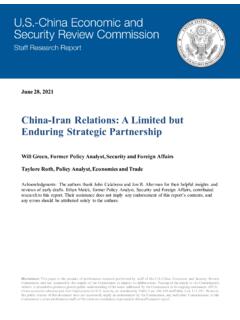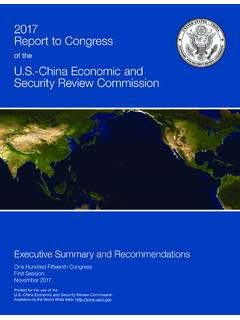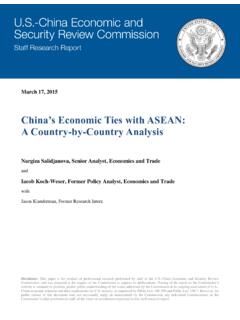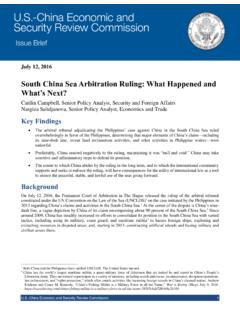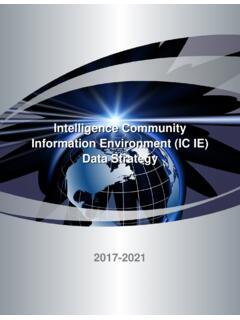Transcription of SECTION 3: CHINESE INTELLIGENCE SERVICES AND …
1 (289) SECTION 3: CHINESE INTELLIGENCESERVICES AND ESPIONAGE THREATSTO THE UNITED STATESI ntroductionThe United States faces a large and growing threat to its national security from CHINESE INTELLIGENCE collection operations. Among the most serious threats are China s efforts at cyber and human infi ltra-tion of national security organizations. These operations are not a recent phenomenon, but reports of CHINESE espionage against the United States have risen signifi cantly over the past 15 The threat from CHINESE INTELLIGENCE operations also extends overseas. For example, China s growing technical INTELLIGENCE * collection ca-pabilities are increasing its ability to monitor deployed military forces. Moreover, by infi ltrating and attempting to infi ltrate defense entities in ally and partner countries, China could affect al-liance stability and indirectly extract sensitive national defense information. Meanwhile, the national security implications of Chi-nese INTELLIGENCE collection operations have grown amid competition and Beijing s expanding military SECTION examines the threat to national security from CHINESE INTELLIGENCE collection.
2 It discusses the structure, role, capa-bilities, process, and operations of China s INTELLIGENCE SERVICES ; responses to CHINESE espionage; and the implications of CHINESE in-telligence collection for national s INTELLIGENCE ServicesChina s INTELLIGENCE community includes CHINESE government, People s Liberation Army (PLA), and CHINESE Communist Party (CCP) institutions that target national security organizations. The following are descriptions of these organizations and their roles within China s INTELLIGENCE community. In all cases, the top priority for these organizations is to support and preserve the CCP-led Chi-nese of State SecurityThe Ministry of State Security (MSS) is a CHINESE government ministry answerable to both China s State Council the chief ad-ministrative authority of the CHINESE government and the CCP Politburo Standing According to Peter Mattis, fellow at the Jamestown Foundation, the MSS is not unlike an amalgam of [the Central INTELLIGENCE Agency] and [the Federal Bureau of Investigation].
3 4 The MSS conducts a variety of INTELLIGENCE col-* Technical INTELLIGENCE here refers to signals, imagery, electronic, and measurements and sig-natures operations, such as human INTELLIGENCE (HUMINT) and cyber IntelligencePLA INTELLIGENCE is responsible for collecting foreign military, eco-nomic, and political INTELLIGENCE * to support military The PLA with its subsidiary units responsible for INTELLIGENCE col-lection answers to China s Central Military Commission (CMC), China s leading military authority, which is dual-hatted as a Chi-nese government organization and a CCP PLA intel-ligence organizations conduct HUMINT operations, as well as tech-nical INTELLIGENCE collection operations, to include cyber to PLA IntelligenceSince late 2015, China has initiated several reforms to the struc-ture of the PLA that have reshaped major elements of PLA in-telligence. Although much is unknown about these reforms, some information has emerged that gives insight into the evolution of PLA PLA AgenciesIn January 2016, CHINESE President and General Secretary of the CCP Xi Jinping announced the reorganization of the PLA s four general departments (the general staff, political, logistics, and ar-maments departments) into 15 new agencies under the The PLA General Staff Department, which had been the primary au-thority for PLA foreign INTELLIGENCE collection, was reorganized into the new Joint Staff Department.
4 However, it is still unclear whether the newly created Strategic Support Force or the Joint Staff Depart-ment will take on the former General Staff Department s superviso-ry responsibilities for INTELLIGENCE the dissolution of the General Staff Department, the most prominent PLA organizations responsible for foreign INTELLIGENCE col-lection were the second, third, and fourth departments of the Gener-al Staff Department. The Second Department (2 PLA) was responsi-ble for the collection and analysis of HUMINT, imagery INTELLIGENCE , and tactical The Third Department (3 PLA) was responsible for collecting signals INTELLIGENCE and conducting cyber According to John Costello, fellow at think thank New America, 3 PLA was roughly equivalent to the National Se-curity Agency in function and mission. 13 The Fourth Department (4 PLA) responsible for electronic warfare and electronic counter-measures surveilled foreign information In addition, theater-level PLA Army, Navy, Air Force, and missile forces con-tained INTELLIGENCE units that mirrored the structure of General Staff Department INTELLIGENCE It is unclear how elements of PLA INTELLIGENCE under the former General Staff Department will be reorganized within the new Joint Staff Department.
5 * Political INTELLIGENCE is INTELLIGENCE concerned with the dynamics of the internal and external political affairs of foreign countries, regional groups, multilateral treaty arrangements, and or-ganizations and foreign political movements directed against or having an impact on established governments or authority. Bruce W. Watson, Susan M. Watson, and Gerald W. Hopple, United States INTELLIGENCE : An Encyclopedia, Garland Publishing, Inc., 1990, 447. For more information on recent PLA reforms, see Chapter 2, SECTION 1, Year in Review: Se-curity and Foreign Affairs. 291 Strategic Support ForceIn December 2015, President Xi announced the formation of the Strategic Support Force, a new branch of the According to Song Zhongping, a professor at the PLA Rocket Force Equipment Research Academy and former PLA Second Artillery Force offi cer, the Strategic Support Force will consist of cyber forces focusing on attack and defense, space forces focus[ing] on reconnaissance and navigation satellites, and electronic warfare forces focusing on jamming and disrupting enemy radar and communications.
6 17 This suggests the Strategic Support Force will take on and central-ize some INTELLIGENCE collection missions and processes previously spread among various elements of the PLA. It is likely that the for-mer 3 PLA and 4 PLA will be subordinated to the Strategic Support Theater Command StructureIn February 2016, President Xi announced the reorganization of China s seven military regions into fi ve theater commands. 19 The structure of theater- and tactical-level military INTELLIGENCE before and after this reorganization is diffi cult to discern using open sourc-es, but it appears the PLA is moving toward greater jointness and integration of the INTELLIGENCE collected by various military SERVICES to inform military decision makers.* 20 Other CHINESE INTELLIGENCE ServicesSeveral other actors in the CHINESE INTELLIGENCE community collect foreign INTELLIGENCE . The following are two notable examples of these organizations.
7 Both have conducted infl uence operations in addition to INTELLIGENCE collection General Political Department International Liaison DepartmentIn addition to the PLA s primary military INTELLIGENCE forces un-der the former General Staff Department, before the dissolution of the PLA s four general departments, the PLA General Political Department International Liaison Department was responsible for collecting foreign INTELLIGENCE through networks of offi cial and un-offi cial agents International Liaison Department agents used informal contacts with foreign actors to identify and investi-gate individuals and organizations to collect INTELLIGENCE and expand China s infl uence It appears the new CMC Political Work Department may take over this United Front Work DepartmentThe United Front Work Department under the CCP Central Com-mittee is responsible for, among other things, building and manag-ing relationships with actors overseas to expand China s soft power and further the CCP s political The department reported-* It appears that PLA military SERVICES (the PLA Army, Air Force, Navy, and Rocket Force), in addition to the theater commands, will have integrated technical reconnaissance units and electronic warfare and electronic countermeasure units.
8 However, the relationship between these units and the new CMC departments and Strategic Support Force is unclear. Junichi Takeda, President Xi s Strong Army Strategy, Gunji Kenkyu (Japan), May 2016, 50 65; CHINESE military expert, interview with participates in building foreign INTELLIGENCE collection networks, particularly in s INTELLIGENCE Collection CapabilitiesAssessing China s INTELLIGENCE collection capabilities is diffi cult. Open source analysts often must rely on media reports, which are not necessarily authoritative and do not necessarily provide a full picture of China s INTELLIGENCE activities. Case studies offer some in-sight, but public reports might not refl ect the most sophisticated CHINESE espionage INTELLIGENCE CapabilitiesBecause the affi liation of CHINESE INTELLIGENCE agents is unknown in many cases, it is often diffi cult to attribute reported infi ltrations to either the MSS or the former 2 PLA, the two primary foreign HUMINT collectors in China s INTELLIGENCE 2 PLA: 2 PLA has demonstrated it can use HUMINT operations to infi ltrate and extract INTELLIGENCE from prominent nation-al security organizations.
9 Notably, between 2004 and 2008, an agent reportedly affi liated with 2 PLA successfully recruited two Department of Defense (DOD) employees, James Fondren and Gregg Bergersen. Both men passed classifi ed national defense information to the agent (see Targets of CHINESE Espi-onage, later in this SECTION ).27 Open sources have not indicated how the reorganization of the CMC departments will affect the subordination and control of the PLA s HUMINT organizations. MSS: In the past ten years, reported cases of CHINESE espionage against the United States have not suggested MSS HUMINT operations have been In the most recent high-pro-fi le HUMINT case reportedly handled by the MSS, the minis-try s informant received tens of thousands of dollars from his handlers to apply for employment at national securi-ty organizations, but was apprehended by authorities be-fore infi ltrating these organizations (see China s Approach to HUMINT, later in this SECTION ).
10 29 However, the MSS has been notably active and successful conducting HUMINT operations against s HUMINT agencies could become more effective as China s INTELLIGENCE community pursues more aggressive operations, and as China s access to detailed sources of personal information on actors such as the information China reportedly obtained through the Offi ce of Personnel Management (OPM) hack gives Chi-nese HUMINT collectors a wealth of information to target and re-cruit INTELLIGENCE Collection CapabilitiesThe PLA operates an extensive and increasingly sophisticated ar-ray of ground-, sea-, air-, and space-based assets for the collection of technical INTELLIGENCE .* 32 Many recent developments in China s mili-tary modernization such as the rapid development and deployment * Technical INTELLIGENCE here refers to signals, imagery, electronic, and measurements and sig-natures advanced INTELLIGENCE , surveillance, and reconnaissance (ISR) ships, aircraft, and satellites will increase China s ability to collect INTELLIGENCE on military forces and the military forces of allies and partners.
